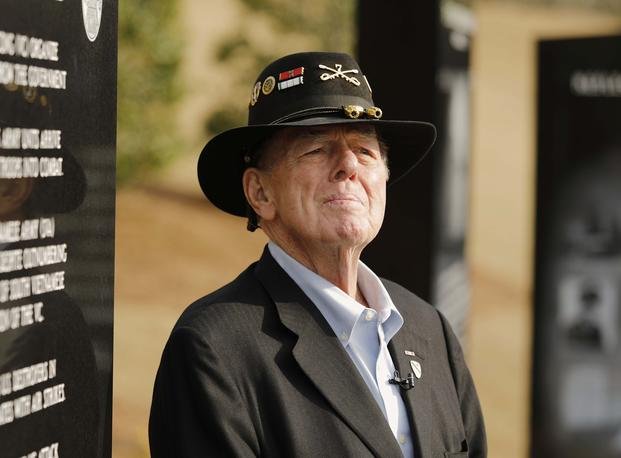WASHINGTON — Longtime American foreign correspondent Joseph L. Galloway, best known for his book recounting a pivotal battle in the Vietnam War that was made into a Hollywood movie, has died. He was 79.
A native of Refugio, Texas, Galloway spent 22 years as a war correspondent and bureau chief for United Press International, including serving four tours in Vietnam. He then worked for U.S. News & World Report magazine and Knight Ridder newspapers in a series of overseas roles, including reporting from the Persian Gulf War in 1991.
Galloway died Wednesday morning, his wife Grace Galloway told AP, after being hospitalized near their home in Concord, North Carolina. He is also survived by two sons and a step daughter.
“He was the kindest, most gentle and loving man,” Grace Galloway said. “He loved the boys and girls of the U.S. military. He loved his country.”
With co-author retired U.S. Army Lt. Gen. Hal Moore, Galloway wrote “We Were Soldiers Once ... And Young,” which recounted his and Moore's experience during a bloody 1965 battle with the North Vietnamese in the Ia Drang Valley. The book became a national best seller and was made into the 2002 movie “We Were Soldiers," starring Mel Gibson as Moore and Barry Pepper as Galloway.
Galloway was decorated with a Bronze Star Medal with V in 1998 for rescuing wounded soldiers under fire during the la Drang battle. He is the only civilian awarded a medal of valor by the U.S. Army for actions in combat during the Vietnam War.
After reporting from the front lines during Operation Desert Storm, Galloway co-authored “Triumph With Victory: The Unreported History of the Persian Gulf War." As he approached age 50, that was Galloway’s last combat assignment, but not the end of his career covering the U.S. military.
In 2002, Knight Ridder asked Galloway to return to reporting after a stint as an adviser to Secretary of State Colin Powell to bolster its Washington bureau’s skeptical coverage of the Bush administration’s case for ousting Hussein.
Galloway did that by contributing, often anonymously, to his colleagues’ stories and by writing a column that often was critical of Vice President Dick Cheney, Defense Secretary Donald Rumsfeld and their aides who were bent on invading Iraq.
John Walcott, Galloway’s longtime editor and friend, recounted how an exasperated Rumsfeld finally asked Joe to meet with him alone in his office. When Joe arrived, he was greeted by Rumsfeld — and a group of other high-ranking Pentagon officials.
“Good,” Galloway reported when he returned to the Knight Ridder office. "I had ‘em surrounded.”
Galloway then described how after Rumsfeld accused him of relying on retired officers and officials, he had told the group that most of his sources were on active duty, and that some of them “might even be in this room."
Asked by his colleagues if that was true, Galloway replied: “No, but it was fun watching ’em sweat like whores in church.”
Galloway's contributions to Knight Ridder’s critical coverage of the Bush administration’s case for invading Iraq was later portrayed in another movie, Rob Reiner’s “Shock and Awe,” in which fellow Texan Tommy Lee Jones played Galloway.
Clark Hoyt, former Washington editor for Knight Ridder, said it was a privilege to work with Galloway, who he called one of the great war correspondents of all time.
"He earned the trust and respect of those he was covering but never lost his ear for false notes. as shown by his contributions to Knight Ridder’s skeptical reporting on the run up to the Iraq war,” Hoyt said.
Walcott said he was an exemplar of what journalism should be. From the People’s Army of Vietnam to Rumsfeld, no one ever intimidated Galloway other than his wife Gracie, Walcott said.
“He never went to college, but he was one of, if not the, most gifted writers in our profession, in which his death will leave an enormous hole at a time when our country desperately needs more like him,” Walcott said. “He never sought fame nor tried to make himself the star of his stories. As sources, he valued sergeants more than brand name generals and political appointees.”













